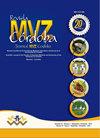塞克硝唑和顺势疗法在犬贾第鞭毛虫病控制中的应用
IF 0.3
4区 农林科学
Q4 AGRICULTURE, DAIRY & ANIMAL SCIENCE
引用次数: 0
摘要
感染贾第鞭毛虫的狗腹泻持续数天,甚至在治疗后也是如此。我们使用两种不同的方法治疗犬贾第虫病:单独使用抗原生动物塞克硝唑治疗;和塞克硝唑加一种顺势疗法产品,用于控制狗腹泻。治疗一:10只比格犬出现严重腹泻的临床症状。它们的粪便显示出大量与贾第鞭毛虫一致的囊肿。因此,我们用塞克硝唑(10 mg/kg,单剂量)口服治疗这些狗。治疗五天后,所有狗的贾第鞭毛虫均为阴性。治疗二:三个月后,同样的十只比格犬再次出现腹泻。收集粪便,发现所有狗都有贾第鞭毛虫。这一次,我们用抗原生动物(塞克硝唑,10 mg/kg剂量)与商业顺势疗法药物联合治疗腹泻(3 g剂量/只,间隔12小时)。我们发现,需要三到五个顺势疗法剂量才能使所有狗的粪便得分正常。治疗5天后,粪便样本具有正常稠度,贾第鞭毛虫呈阴性。这是首次使用塞克硝唑控制犬贾第鞭毛虫病,并使用顺势疗法药物预防腹泻。本文章由计算机程序翻译,如有差异,请以英文原文为准。
Use of secnidazole and homeopathy for giardiasis control in dogs
Dogs with Giardia infections have diarrhea that persists for days, even after treatment. We managed canine giardiasis using two distinct approaches: treatment with the antiprotozoan secnidazole alone; and secnidazole plus a homeopathic product that is indicated for control of diarrhea in dogs. Treatment I: Ten beagle dogs showed clinical signs of severe diarrhea. Their feces revealed large numbers of cysts consistent with Giardia sp. Therefore, we treated the dogs with secnidazole (10 mg/kg, single dose) given orally. Five days after treatment, all dogs were negative for Giardia spp. Treatment II: Three months later, the same ten Beagles again presented with diarrhea. Feces were collected, revealing Giardia sp. in all dogs. This time, we treated them with an antiprotozoan (secnidazole, 10 mg/kg dose) combined with a commercial homeopathic drug for diarrhea control (3 g dose/animal at 12 h interval). We found that three to five homeopathic doses were needed to achieve normal fecal scores in all dogs. After 5 days of treatment, stool samples had normal consistency and were negative for Giardia. This is the first record of using secnidazole to control canine giardiasis associated with homeopathic drugs to prevent diarrhea.
求助全文
通过发布文献求助,成功后即可免费获取论文全文。
去求助
来源期刊

Revista Mvz Cordoba
农林科学-奶制品与动物科学
CiteScore
0.70
自引率
0.00%
发文量
41
审稿时长
6-12 weeks
期刊介绍:
The Journal MVZ Córdoba is an open access international scientific journal financed and edited by the University of Córdoba (Colombia). The journal publishes quarterly, continuously in PDF, XML, Epub, original articles, literature reviews, brief communications and clinical cases, peer-reviewed (double-blind) in Spanish and English, which are related to the agricultural and veterinary sciences. The journal is directed to natural and legal persons of veterinary medicine, animal husbandry, public health, epidemiology, aquaculture, biology, basic biomedical sciences and biotechnology and constitutes a space for academic and scientific discussion around the work of professionals in Veterinary Medicine and Zootechnics. Four-monthly publication.
"The Journal MVZ Córdoba supports the policies for registration of clinical trials of the World Health Organization (WHO) and the International Committee of Medical Journal Editors (ICMJE), since it recognizes the importance of these initiatives for international registration and dissemination. of information about clinical studies, in open access. As a result, since 2007, the journal MVZ Córdoba only publishes clinical research articles that have received an identification number in one of the Clinical Trial Registries validated by the criteria established by WHO and ICMJE, whose addresses are available in the ICMJE website. The identification number is recorded at the end of the summary. "
 求助内容:
求助内容: 应助结果提醒方式:
应助结果提醒方式:


